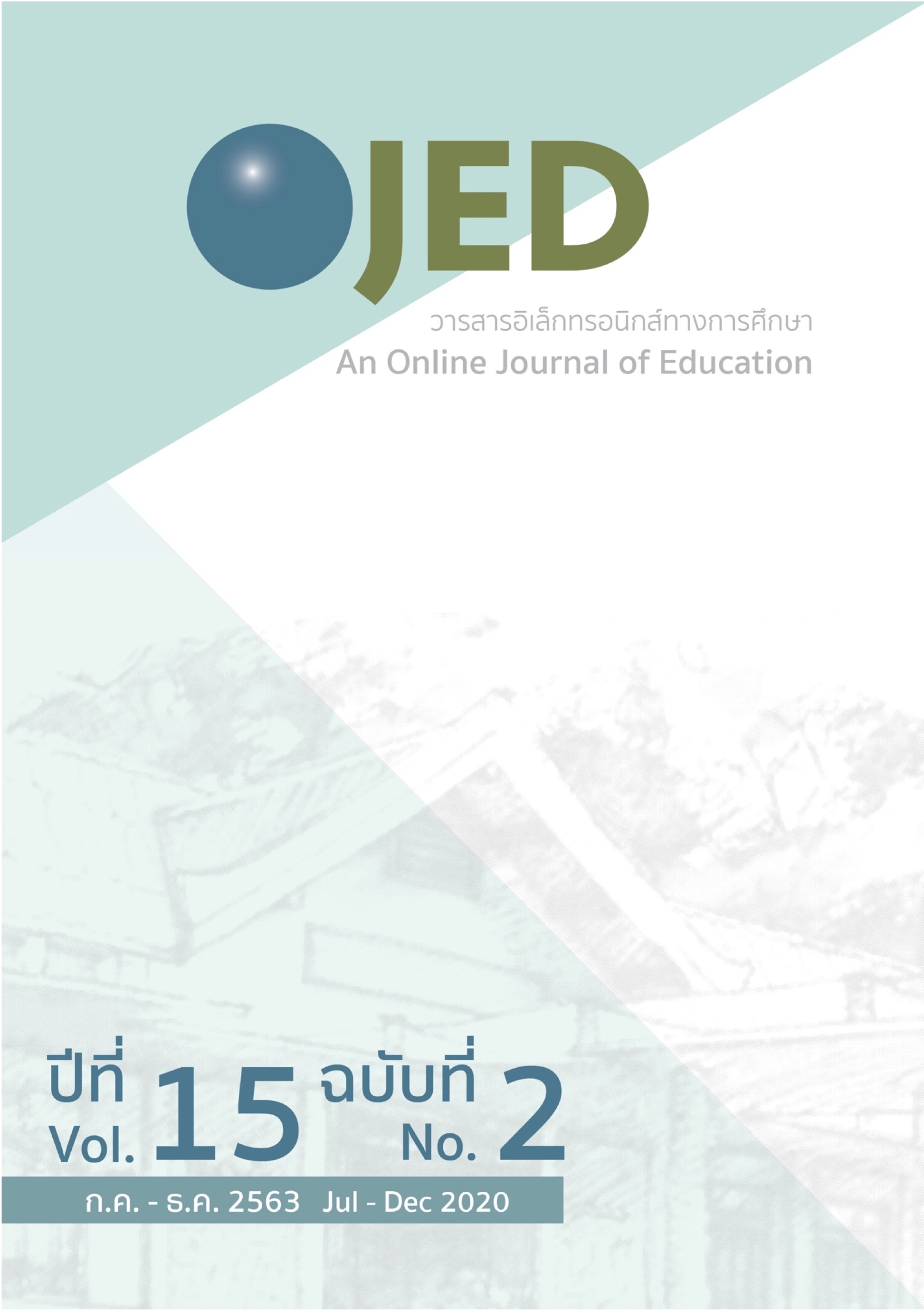Effects of Organizing Mathematics Learning Activities on Mathematical Problem Solving and Reasoning Abilities of Seventh Grade Students using Problem-Oriented Teaching
DOI:
https://doi.org/10.14456/ojed.2020.9Keywords:
problem-oriented teaching, mathematics problem solving abilities, mathematics reasoning abilitiesAbstract
The purposes of this research were: 1) to compare mathematical problem solving and reasoning abilities of the students by organizing mathematics learning activities using problem-oriented teaching to the between, before and after learning; 2) to compare mathematical problem solving and reasoning abilities of the students learning by organizing mathematics learning activities using problem-oriented teaching to the 60%, and 3) to study the development of mathematical problem solving and reasoning abilities of the students who are taught by organizing mathematics learning activities using problem-oriented teaching. The subjects of this paper were seventh grade students of an extra-large school in Bangkok, which were selected by purposive sampling. There were 44 students in the experimental group. The experimental instruments were the use of the lesson plan focusing on organizing mathematics learning activities using problem-oriented teaching. The instruments for data collection were mathematical problem solving ability tests and mathematical reasoning ability tests. The data so obtained were analyzed by using arithmetic mean, standard deviation, percentage, t-test, and by content analysis.
The results of the research reveal that 1) the mathematical problem solving and reasoning abilities of the experimental group were higher than before the experiment at a .05 level of significance; 2) the mathematical problem solving and reasoning abilities of the experimental group were higher than 60% at a .05 level of significance, and 3) the mathematical problem solving and reasoning abilities of the experimental group improved.
References
กุลนิดา วรสารนันท์. (2552). ผลของการจัดกิจกรรมการเรียนรู้คณิตศาสตร์ โดยใช้โมเดลการอุปนัยที่มีต่อมโนทัศน์ และความสามารถในการให้เหตุผลทางคณิตศาสตร์ ของนักเรียนชั้นมัธยมศึกษาปีที่ 3. (วิทยานิพนธ์ปริญญามหาบัณฑิต), จุฬาลงกรณ์มหาวิทยาลัย.
ธัญพิมล จันทร์นุ่ม. (2558). ผลของการจัดกิจกรรมการเรียนรู้ตามแนวการศึกษาคณิตศาสตร์ที่สอดคล้องกับชีวิตจริงร่วมกับการพัฒนาความคิดของเด็กที่มีต่อความสามารถในการให้เหตุผลทางคณิตศาสตร์และความสามารถในการสื่อสารทางคณิตศาสตร์ของนักเรียนระดับชั้นมัธยมศึกษาปีที่ 2. (วิทยานิพนธ์ปริญญามหาบัณฑิต), จุฬาลงกรณ์มหาวิทยาลัย.
ธีรพล พากเพียรกิจ. (2558). ผลของการจัดกิจกรรมการเรียนรู้โดยใช้แนวคิดโมเดลเมธอดและการเรียนการสอนแบบแนะให้รู้คิดที่มีต่อความสามารถในการแก้ปัญหาทางคณิตศาสตร์ ของนักเรียนชั้นมัธยมศึกษาปีที่ 2. (วิทยานิพนธ์ปริญญามหาบัณฑิต), จุฬาลงกรณ์มหาวิทยาลัย.
ปรีชา เนาว์เย็นผล. (2538). การแก้ปัญหาทางคณิตศาสตร์ การพัฒนาทักษะการคิดคำนวณของนักเรียนระดับประถมศึกษา. กรุงเทพฯ: โรงพิมพ์จุฬาลงกรณ์มหาวิทยาลัย.
ศักดา บุญโต. (2544). เทคนิคการสอนคณิตศาสตร์ระดับประถมศึกษาตอนต้น. กรุงเทพฯ: มูลนิธิสดศรี-สฤษวงศ์.
สถาบันการสอนวิทยาศาสตร์และเทคโนโลยี. (2556). คู่มือการใช้หลักสูตร กลุ่มสาระการเรียนรู้คณิตศาสตร์ระดับมัธยมศึกษาตอนปลาย ฉบับปรับปรุง พ.ศ. 2556: กระทรวงศึกษาธิการ.
สถาบันส่งเสริมการสอนวิทยาศาสตร์และเทคโนโลยี. (2555). ทักษะและกระบวนการทางคณิตศาสตร์. กรุงเทพมหานคร: 3-คิว มีเดีย.
สถาบันส่งเสริมการสอนวิทยาศาสตร์และเทคโนโลยี. (2559). สรุปผลการวิจัยโครงการ TIMSS 2015. from สถาบันส่งเสริมการสอนวิทยาศาสตร์และเทคโนโลยี
สถาบันการสอนวิทยาศาสตร์และเทคโนโลยี. (2561). สรุปผลการวิจัย PISA 2015. https://drive.google.com/file/d/0Bwq5b7zScUJOOV9ldUNfTlk/view
สถาบันทดสอบทางการศึกษา. (2561). สรุปผลการทดสอบทางการศึกษาระดับชาติพื้นฐาน (O-NET) ชั้นมัธยมศึกษาปีที่ 3 ปีการศึกษา 2561.
สุดารัตน์ ภิรมย์ราช. (2555). ผลของการใช้เทคนิค Think-Talk-Write ร่วมกับการจัดกิจกรรมการเรียนรู้คณิตศาสตร์แบบสืบสอบที่มีต่อความสามารถในการให้เหตุผล และการสื่อสารทางคณิตศาสตร์. (วิทยานิพนธ์ปริญญามหาบัณฑิต), จุฬาลงกรณ์มหาวิทยาลัย.
อัมพร ม้าคนอง. (2553). ทักษะและกระบวนการทางคณิตศาสตร์: การพัฒนาเพื่อพัฒนาการ. กรุงเทพมหานคร: ศูนย์ตำราและเอกสารทางวิชาการ คณะครุศาสตร์ จุฬาลงกรณ์มหาวิทยาลัย.
Hu, Y., Xing, J., & Tu, L. P. (2018). The Effect of a Problem-oriented Teaching Method on University Mathematics Learning. EURASIA Journal of Mathematics, Science and Technology Education, 14(5), 1695-1703.
National Council of Teachers of Mathematics. (2009). Focus in High School Mathematics: Reasoning and Sense Making. Reston, VA: National Council of Teachers of Mathematics.
Rowan, T., & Morrow. (1993). Implementing K-8 Curriculum and Evaluation Standards from the Arithmetic Teacher. MA: Ally and Bacon.
Downloads
Published
How to Cite
Issue
Section
License
Copyright (c) 2020 An Online Journal of Education

This work is licensed under a Creative Commons Attribution-NonCommercial-NoDerivatives 4.0 International License.




